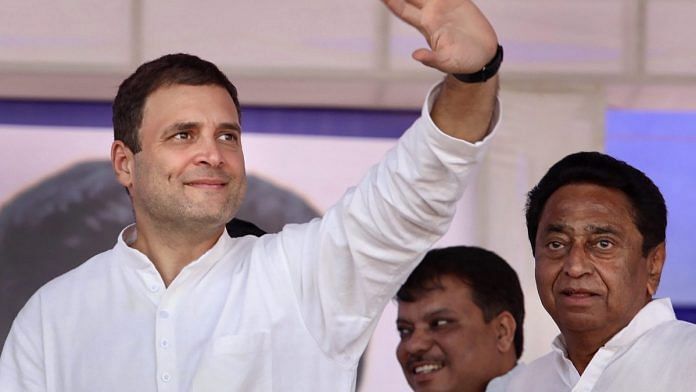In its election manifesto, Madhya Pradesh Congress has proposed to reintroduce board exams in class 8 to improve the quality of education.
New Delhi: The Madhya Pradesh Congress in its election manifesto has proposed to overturn what the United Progressive Alliance (UPA) considered one of its major reforms in the field of education — the introduction of no-detention policy under the Right to Education (RTE) Act.
In its manifesto titled ‘Vachan Patra’ (document of promises), the state Congress has said it would take steps to reintroduce board exams in class 8 to improve the quality of education.
The proposed policy is in contrast to the current RTE system under which exams are held from class 9 onwards.
The no-detention policy, enforced on 1 April 2010 by the UPA government, states that students up to class 8 can’t be detained by schools across the country.
Earlier this year, the National Democratic Alliance (NDA) government too passed a bill in Lok Sabha to amend the no-detention policy under the RTE Act, giving states the right to change the law. The bill is yet to be passed by the Rajya Sabha.
Manifesto provisions
In the 112-page manifesto released in Bhopal Saturday, the opposition party said it would ensure that monthly exams are held for all subjects to improve the quality of education in middle schools.
The party also promised to do away with the practice of e-attendance for teachers and students in schools and higher education institutions.
“Attendance of teachers and students would be ensured and the practice of e-attendance would be done away with because of which teachers and students feel humiliated,” the manifesto said.
The manifesto was released in the presence of state Congress president Kamal Nath, state campaign committee chief Jyotiraditya Scindia and former chief minister Digvijaya Singh.
Madhya Pradesh goes to polls on 28 November and votes will be counted on 11 December.
Also read: We have failed our children by removing no-detention clause from RTE
Flawed policy?
Senior Congress leader Kapil Sibal, under whose tenure as human resource development (HRD) minister the RTE Act came into force, told the Print that he was not consulted on the matter.
“It is Madhya Pradesh Congress manifesto. They have to decide what to include in it. I was not consulted and I was also not in India,” he said.
Sibal has previously defended the policy citing the positive impact it had on arresting the dropout rate. He has also claimed that the policy was not understood properly by the states and so its implementation wasn’t done in the right manner.
For the past few years, concerns have been raised about the negative impact of the no-detention policy on the academic performance of the students and the Congress manifesto seems to echo the same sentiments.
Many states, especially Delhi, have been quite vocal about the flaws in the policy.
“The situation is very grim as far as education is concerned in the state,” said Abhay Dubey, spokesperson, Madhya Pradesh Congress Committee.
“It is true that no-detention policy was introduced but the exam that we have proposed will not only be an external one but will assess the overall development of the student too. But yes, there will be an external exam,” he added.
Also read: Scared of being dumped, Madhya Pradesh BJP MPs queue up for assembly tickets
Amendment
After holding consultation with states, the Central Advisory Board of Education in 2016 decided to give states the right to decide whether they want to have the no-detention policy or not.
However, this necessitated an amendment in the RTE Act.
The NDA government passed a bill in the Lok Sabha in July to amend the RTE Act to abolish the no-detention policy in schools. As per the amendment, it would be left to states to decide whether to continue the policy. The amendment also allows states to evolve their own detention policy from class 5 onwards.
The bill hasn’t been passed in the Rajya Sabha as yet.
A key component of the RTE Act, the no-detention policy was enforced with the aim of ensuring that every child aged between 6 and 14 received school education.



